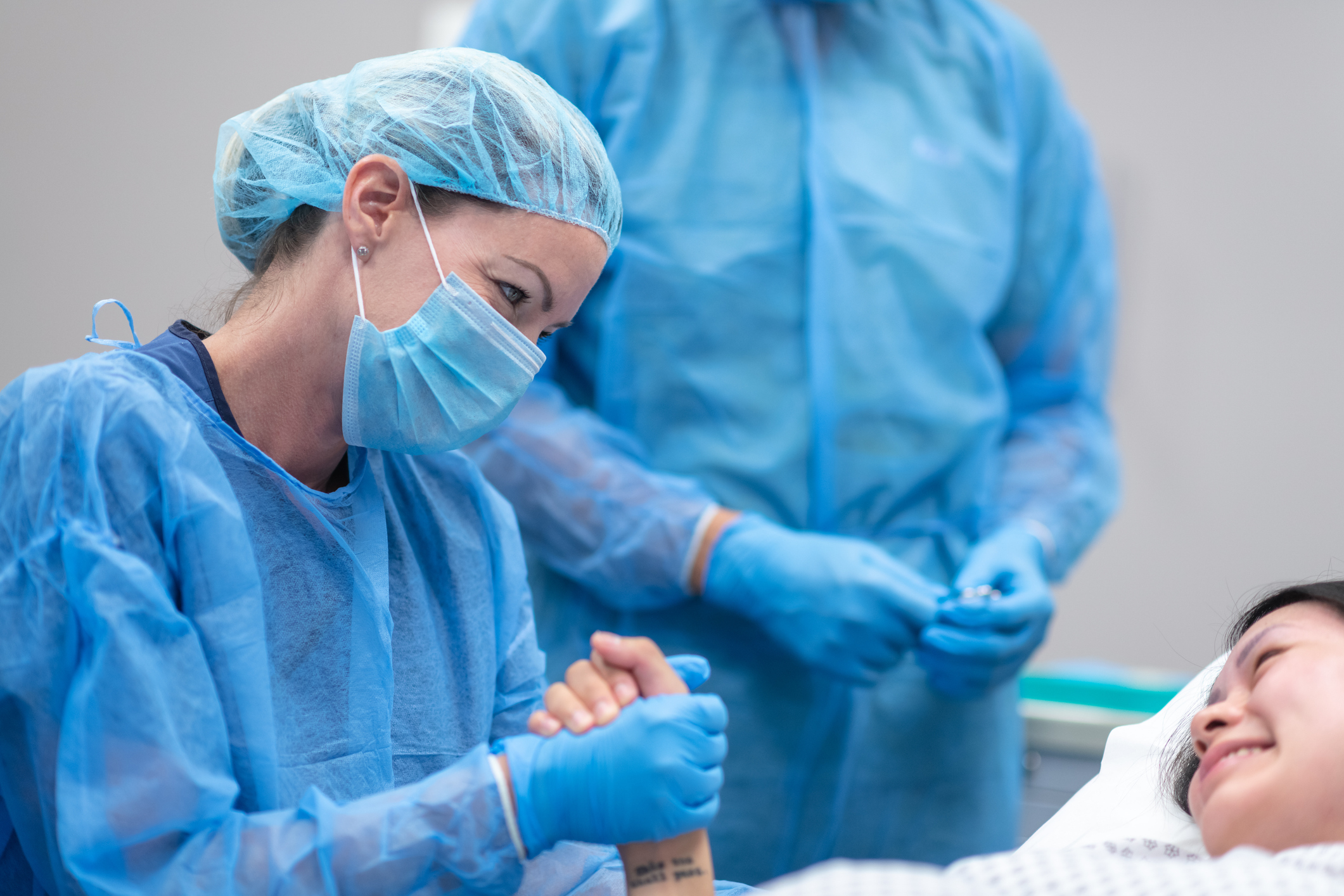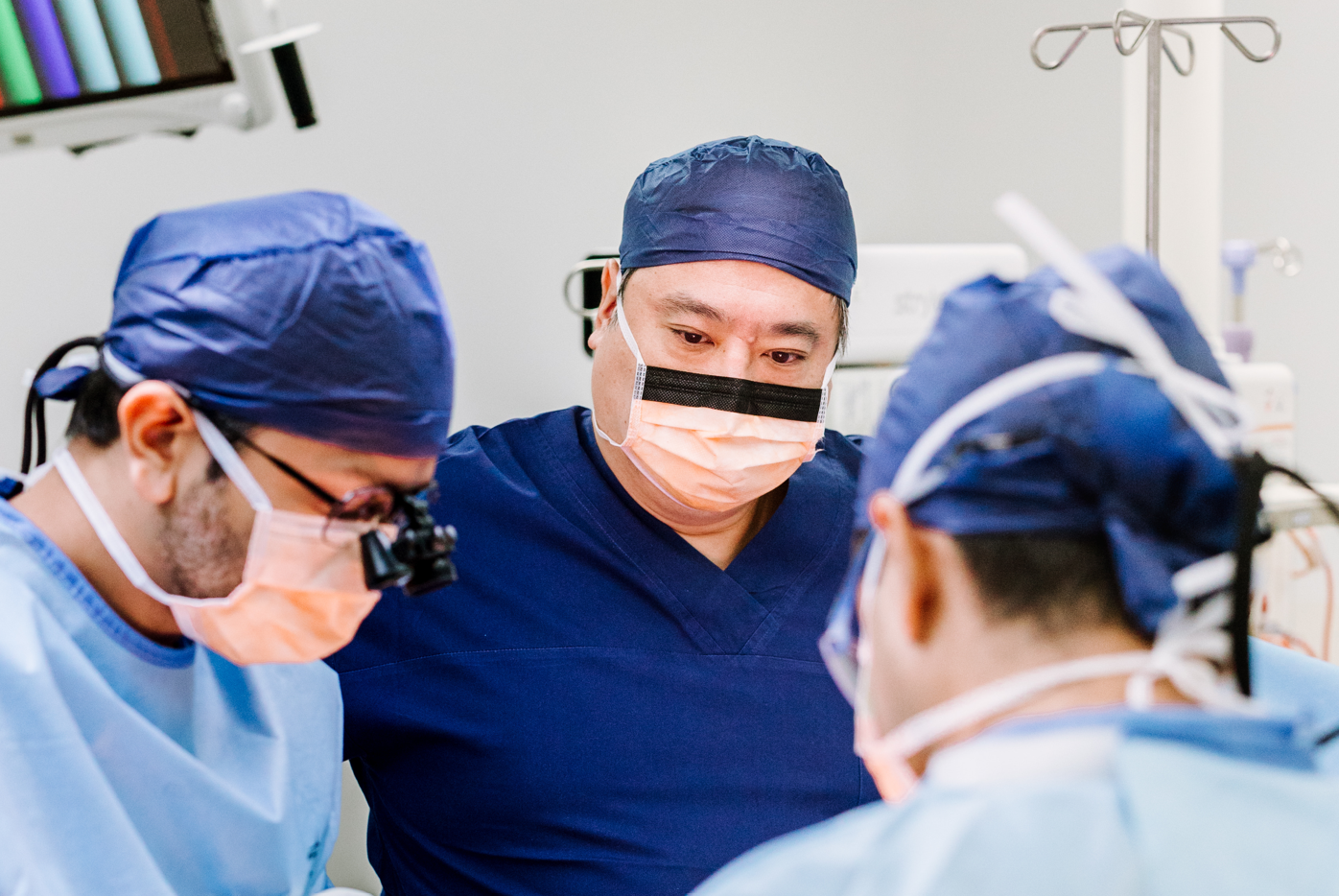
Neuro and spine surgery
Whatever your reason for surgery, you’re in highly skilled hands at Norwest Private Hospital. Our team of world class neurosurgeons and orthopaedic spine surgeons work in truly state-of-the-art facilities, where the focus is always you.
We’re local, in Bella Vista, which is comforting for many of our patients and their families. But we also welcome patients from all over New South Wales.
Find a neurosurgeon
Our neurosurgeons are dedicated to treating patients across a range of neuro conditions and disorders.
Find a spine surgeon
Our spine surgeons and orthopaedic spine surgeons are experts at treating a range of spine conditions.
Find a neurologist
Our team of neurologists work with patients living with conditions affecting the nervous system.
What is neuro and spine surgery?
Neurosurgery involves intricate procedures to treat conditions or injuries affecting the spine, brain and peripheral nerves and surgeons need a very high level of surgical expertise. Neurosurgery is a high-risk but precise procedure. Our highly skilled Sydney neurosurgeons and orthopaedic spine surgeons use the latest technology to manage a range of conditions affecting the nervous system.
Conditions
Brain tumour surgery is one of the most common neurosurgical procedures. As tumours grow, they can affect brain function and lead to a range of symptoms. Surgery is designed to alleviate symptoms and, in cases of brain cancer, maximise the effectiveness of oncology treatments. Surgery may involve a biopsy to test a tumour testing, along with removing and/or reducing the tumour.
Blood vessels that supply oxygen to the brain can become blocked, malformed, or tear, making a stroke highly likely. Conditions like bulging blood vessels (aneurysms), blocked arteries, and arteriovenous malformations (AVMs) may require urgent neurosurgery.
The peripheral nervous system connects the brain and spine (central nervous system) to the body. Peripheral nerves can be affected by pressure, injury or growths (usually benign), leading to symptoms including pain, tingling and movement difficulties. Surgery aims to relieve symptoms and restore function.
These tumours form in the space below the brain, behind the eyes and nose, and can be malignant or benign. They need to be removed to alleviate pressure on the brain areas and vital nerves involved in movement, vision and hormonal function. Minimally invasive neurosurgery is often appropriate for skull base procedures.
Our specialists perform procedures to treat spinal conditions including compressed or ‘pinched’ spinal nerves, degenerative disc disease, spinal stenosis, trauma, deformities like scoliosis, and tumours. We specialise in endoscopic spine surgery (ESS) which is minimally invasive spinal surgery performed through a keyhole approach.
Meet our world class surgeons
Neurosurgeons
Dr Renata Abraszko
Neurosurgeon and Spine Surgeon
Renata is an internationally trained neurosurgeon who performs both neurosurgery and spine surgery. Her areas of special interest include spine surgery, minimally invasive spine surgery, motion preservation spine surgery, brain tumours, cerebro-vascular malformations, and brain injuries.
A/Prof Darweesh Al Khawaja
Neurosurgeon and Spine Surgeon
Darweesh is a neurosurgeon who performs both cranial and spinal neurosurgery. He subspecialises in skull-base surgery, cerebello-pontine angle tumours, and endoscopic surgery. Darweesh has special interests in minimal invasive surgery, spinal tumours, complex spine surgery, peripheral nerve surgery, and cranial surgery.
Dr Shanu Gambir
Neurosurgeon and Spine Surgeon
Shanu is a neurosurgeon and spine surgeon who practises a minimalistic approach to ensure the best patient outcomes. He performs spinal, brain and peripheral nerve procedures and uses a minimally invasive approach including endoscopic procedures.
Dr Andrew Kam
Neurosurgeon and Spine Surgeon
Andrew is a neurosurgeon and spine surgeon who has a strong interest in minimally invasive spinal surgery and robotics-assisted spinal surgery, cervical and lumbar disc arthroplasty, degenerative scoliosis, traumatic and oncologic conditions of the spine.
Dr Young-Jun Kim
Neurosurgeon and Spine Surgeon
Jun is a neurosurgeon with special interests in the following areas: cerebrovascular disorders - AVM, aneurysm, moyamoya disease, tumours – vestibular schwannoma, meningioma, glioma, pituitary tumours, endoscopic skull base surgery, trigeminal neuralgia, and peripheral nerve surgery.
Dr Yingda Li
Neurosurgeon and Spine Surgeon
Yingda is a neurosurgeon and spine surgeon. His expertise includes complex and minimally invasive spinal surgery, including advanced endoscopic and robotic techniques.
Dr Jacqueline McMaster
Neurosurgeon and Spine Surgeon
Jaqueline is a neurosurgeon who has gained advanced fellowship training in stereotactic and functional neurosurgery, obtained from the University of British Columbia in Canada. She offers treatment in a wide variety of neurosurgical disorders, both cranial and spinal with a special interest in movement disorders.
Prof Brian Owler
Neurosurgeon and Spine Surgeon
Brian offers a comprehensive neurosurgical service covering both paediatric and adult conditions. He is an Australian trained neurosurgeon with extensive experience in the treatment of cranial and spinal neurosurgical conditions. His special interests include tumours of the brain and spine, spinal disorders, hydrocephalus and other CSF circulation disorders. Brian uses a minimally invasive approach including endoscopic procedures.
Dr Vanessa Perrotti
Neurosurgeon and Spine Surgeon
Vanessa is a neurosurgeon with interests in all aspects of neurosurgery including brain, spine conditions and peripheral nerve disorders. She takes a personalised evidence based approach with all of her patients. Vanessa's areas of interest include neck and back pain, sciatica, peripheral nerve disorders, spinal disc and degenerative spine disease, brain and spinal tumours, brain and spine injury.
Dr Prashanth Rao
Neurosurgeon and Spine Surgeon
Prashanth is a neurosurgeon and spine surgeon. He has undertaken further specialisation training in minimally invasive spine surgery, spinal tumours and complex spine surgery at the Prestigious Royal Adelaide Hospital and peripheral nerve surgery at the renowned Royal National Orthopaedic Hospital, Stanmore, London. He believes in and ensures personalised multidisciplinary care for optimal outcomes for his patients. Prashanth uses a minimally invasive approach including endoscopic procedures.
Orthopaedic spine surgeons
Dr Brian Hsu
Orthopaedic Spine Surgeon
Brian is an adult and paediatric spine surgeon. His areas of interest lie in all aspects of spine surgery and spinal disorders, in particular spine deformity, complex cervical reconstructions, spinal osteotomies and degenerative cervical and lumbar conditions. Brian uses a minimally invasive approach including endoscopic procedures.
Dr Anil Nair
Orthopaedic Spine Surgeon
Anil is an orthopaedic surgeon, specialising in spinal surgery. He has a particular interest in complex spinal surgery, minimally invasive spine surgery and intervertebral disc replacement surgery.
Dr Bhisham Singh
Orthopaedic Spine Surgeon
Bhisham is an orthopaedic surgeon with a special interest in spine surgery. He is experienced in treating cervical, thoracic and lumbar spine issues as well as orthopaedic conditions. He treats all conditions of the spine from the neck to the lower back in both adults and children. Bhisham uses a minimally invasive approach including endoscopic procedures.
Why choose Norwest Private Hospital?
- Minimal wait times for surgery
- We provide endoscopic spine surgery (ESS)
- Choose your surgeon from our extensive network of experienced specialists
- We’re accredited against the National Safety and Quality Health Service Standards
- Nurses deliver exceptional care in our neurosurgery and orthospine ward, and passionate allied health professionals support your recovery


Leading neurosurgery technology
Our neurosurgeons have access to the latest technology at Norwest Private Hospital.
This includes the Zeiss Kinevo 900 (pictured) which combines microscope and endoscope to eliminate ‘blind spots’, allowing surgeons to see ‘around corners’ of arteries, nerves and brain tissue.
Endoscopic spine surgery (ESS)
Endoscopic spine surgery (ESS) is used to treat spinal disorders and conditions including disc herniation, spinal stenosis and degenerative disc disease requiring spinal stabilisation. It’s a minimally invasive procedure designed to facilitate a quicker recovery time.
Dr Brian Hsu, was the first surgeon in Australia to perform an endoscopic spine surgery (ESS) procedure at Norwest Private Hospital. Since then Norwest Private has embraced this technology and established the technique as a standard of patient care.
Today, modern navigation technology like Joimax allows surgeons at Norwest Private to visualise the position of the endoscopic instruments as they are placed in the patient’s body, reducing radiation exposure and surgical personnel as there is less reliance on x-rays.
Your multidisciplinary team
At Norwest Private Hospital our neurosurgeons and orthopaedic spine surgeons work with a multidisciplinary team of experts to get the best possible outcome for their patients. This includes:
- neurologists
- perioperative physicians
- neuro-oncologists
- neuro-radiation oncologists
- neuro-pathologists
- head and neck surgeons
- pain specialists
- rehabilitation specialists
- allied health team
Care after surgery
Providing comprehensive quality care for our patients is our priority. Following surgery, patients are cared for on a dedicated ward by experienced nursing staff who are skilled in spinal and neuro surgeries and who will arrange your physiotherapy, discharge rehabilitation and any other support services you require.
Risks
All surgical procedures carry some amount of risk and only a specialist can advise whether surgery is right for you. Before agreeing to any treatment, make sure you understand what’s involved and any possible side effects and risks. It’s vital that you seek specialist medical advice that’s right for your circumstances.
How much will surgery cost?
All surgeries performed in a private hospital involve an out-of-pocket fee. The amount will depend on the surgery you’re having and - where you have private health fund cover - whether the surgery that is right for you is included in that cover. Your surgeon will be able to give you an indication of out-of-pocket costs.
If you don’t have private health insurance you can choose to self-fund your surgery. Your surgeon can talk to you about this option.
What next?
Talk to your GP or specialist who can refer you to one of our specialists.



